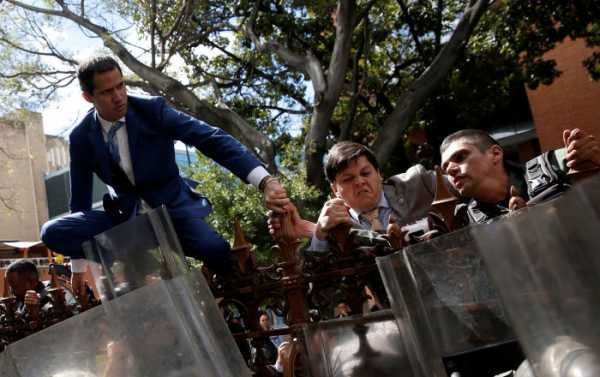
Venezuela’s opposition is seen by the country’s people as corrupt and opportunistic, while Venezuelan self-proclaimed interim president is losing his grip, say former Hugo Chavez adviser Heinz Dieterich and Argentine geopolitical analyst Juan Martin Gonzalez Cabañas, outlining possible scenarios for the nation’s future.
Venezuela’s self-proclaimed “interim president” Juan Guaido continues his struggle for power while the nation is bracing for a 2020 parliamentary vote to elect the 167 deputies of the National Assembly.
His influence continues to wane since Luis Parra was elected the new speaker of the country’s parliament on 5 January. The speaker’s role is crucial for Guaido being the only basis of his claim to be Venezuela’s “legitimate interim president”. In order to retain his positions the opposition lawmaker called a “parallel” parliament session after his supporters declared his “re-election”.
Guaido Losing Grip, But US Has Nobody in Sight to Replace Him
Having defied his failure to maintain leadership of the National Assembly, the self-proclaimed interim president called for more protests against Venezuelan President Nicolas Maduro. On 20 January, US Secretary of State Mike Pompeo met with Guaido in Bogota, Colombia, and voiced his solidarity with the opposition lawmaker.
According to the professor, the opposition parties are currently busy fighting among themselves for control over the Venezuelan state. “Venezuela’s citizens rightly see them as corrupt and opportunistic and there is no political leader capable of galvanising the masses”, he remarks.
What’s Behind Maduro’s Sustainability
Venezuelan President Maduro, meanwhile, remains at the helm of the country, despite US Venezuela envoy Elliot Abrams’ earlier assertions that Maduro would “fall” by the end of 2019.
Juan Martin Gonzalez Cabañas, Argentine geopolitical analyst at Dossier Geopolitico, believes that so far the main cause behind the sustainability of the Maduro government “has been the support of the Venezuelan armed forces and social sectors which benefited from the policies of Chavismo, as well as the lack of perspectives and capabilities of the opposition”.
At the same time, one of the main pivots to mitigate economic restrictions imposed by the US and its allies on the Maduro government is the “support of extra continental actors, such as China and Russia”, he highlights.
The former adviser to the late Venezuelan president Hugo Chavez also emphasises the role of Moscow and Beijing elaborating that “several factors play a role”.
Dieterich notes that “another income source are precious metal exports”, while “remittances from exiled citizens” as well as a “sell-out of natural and social resources” of the country also keep the economy afloat.

Venezuela’s President Nicolas Maduro during a meeting with members of the Popular Units of Integral Defense, in Caracas
A US-Venezuela Deal or Continuous Impasse?
However, both Dieterich and Gonzalez Cabañas agree that there’s no room for significant improvement for the Venezuelan economy in the medium and short term.
On 18 January, in an interview with The Washington Post, Venezuelan President Nicolas Maduro highlighted that he is still in control of Venezuela and is open to dialogue with the US to solve their confrontational relationship.
Gonzalez Cabañas holds a slightly different stance: though negative factors may continue to shatter Maduro’s positions, given “the lack of vitality of other political forces, the situation will continue in a stalemate, in an impasse”, he thinks.
He opines that Caracas would have been capable of breaking the stalemate if its neighbours lend a helping hand to it, stressing that Latin American solidarity is the key to withstanding Washington’s pressure in the region.
Will Geopolitical Players Help Untie Venezuelan Knot?
From a geopolitical standpoint, “the situation in the global balance of support for Venezuela and the Maduro government is very complex”, Gonzalez Cabañas says.
“A realistic position in international relations (one that seeks rationality between risks and benefits in foreign action) would tell us that the continental [Eurasian] powers will not ‘over’-engage in the Venezuelan situation, because they are involved on several fronts, including some in even more strategic regions in this ‘Great Game’, so it would not make much sense for them get too involved in a relatively peripheral front in their global bid”, the geopolitical analyst presumes.
For his part, Heinz Dieterich believes that only major geopolitical players are capable of untying the Venezuelan knot. According to him, “the internal opposition of the political parties will not decide anything in the power struggle for the future of Venezuela”.
The views and opinions expressed in the article do not necessarily reflect those of Sputnik.
Sourse: sputniknews.com






